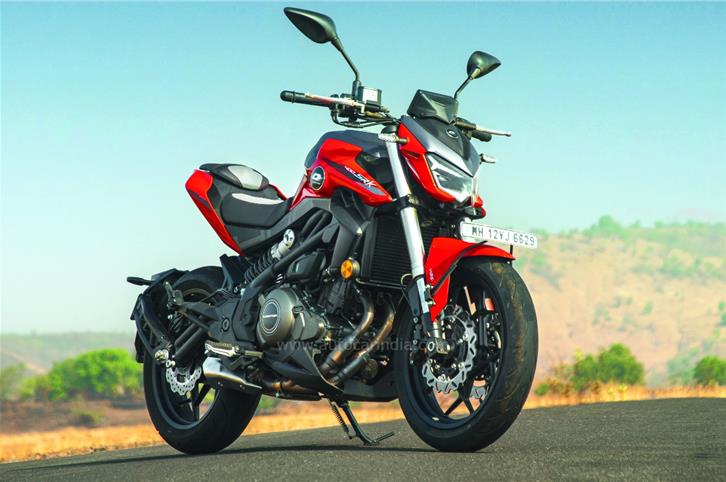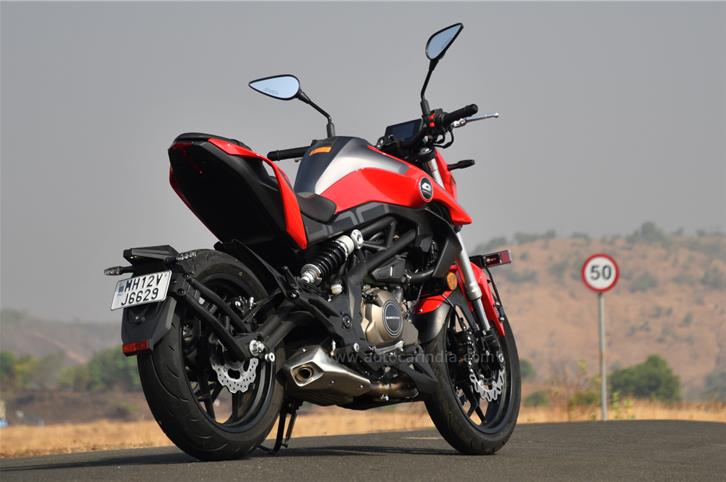Does newcomer QJMotor’s SRK 400 have what it takes to take on the established KTM 390 Duke?
Published on Apr 29, 2023 07:00:00 AM
6,231 Views
Follow us on

The SRK’s engine sounds enticing, but lacks refinement.

Of late, there’s been an influx of Chinese-owned brands in India that have been garnering plenty of attention. The latest in this line is QJMotor, which has entered our market with four models. The most powerful and expensive of the lot is the SRK400 street naked, and we’ve now spent a few days riding it.
What is sure to be a big draw for potential buyers is the SRK400’s engine. As the name denotes, it’s a 400cc, liquid-cooled, parallel-twin that puts out respectable figures of 40.9hp and 37Nm. And they won’t want it just for the specifications, as it also has a very sweet exhaust note, just like the Benelli twins it is based on.

Performance is good too, as the SRK does 0-100kph in 5.86s, which is just 0.01s slower than the new KTM RC 390 we recently tested. As for in-gear acceleration, the QJ betters the KTM’s time in the 20-50kph and 50-80kph runs, but the latter is quicker in the 30-70kph run. The QJ makes its peak power at 9,000rpm so you have to wring it to extract the most from it. But when you do that, you’re faced with what is this motor’s biggest shortcoming.
Being a parallel-twin, you’d expect the SRK’s motor to be buttery smooth, but that isn’t the case. While vibrations are nominal at idle, you do start to feel a lot of buzziness on the handlebar and the foot pegs as you begin to pick up the pace. Our test unit was brand new, so a first service should ideally make it a bit smoother. But still, it’s not a feeling you’d want from a twin.
On the move, the SRK400 does feel like it weighs close to 190kg, but it’s easily manageable. You have plenty of leverage to filter through traffic, the clutch action is light enough and the engine heat is managed well. You’re also sat upright and the foot pegs aren’t too rear set. The only thing that makes life uncomfortable, quite literally, is the hard seat padding.
However, the ride quality does help alleviate this. The SRK feels composed over most bumps and it’s only the sharpest and nastiest of bumps that catch it out. Suspension duties are handled by a USD fork up front and a monoshock that is adjustable for spring preload and rebound damping. The handling, meanwhile, is neutral, but it does take a little effort to tip it into corners and there isn’t much feedback from the front end. It also weighs up in an unusual manner as sometimes it feels loose and disconnected, while other times the steering feels heavy. However, the grip from the Maxxis tyres is more than sufficient.

Coming to braking, while it does come with twin discs up front and has ample stopping power, the brakes just aren’t feelsome enough. There’s a lack of initial bite and under panic braking situations, the ABS tends to intervene making the lever go hard, which isn’t a nice feeling.
The SRK400 is a sharp-looking bike too. I particularly like the minimalist rear end with the tyre hugger, the offset monoshock and the exposed trellis frame. The front end looks aggressive thanks to the chiselled tank, small bikini fairing and dual projector headlights. While the design looks derived from a particular Japanese brand, you can’t deny that it does turn heads.

What is a let down though is the way this bike’s been put together. Our test bike was brand new and there already were some panel gaps and rattles from the bodywork. Even some of the materials – like the instrument cluster housing – had sharp edges and weren’t sitting flush with the display. And when you’re paying around Rs 4 lakh for a motorcycle, you really expect better.
Speaking of expecting better, that’s also the feeling that comes across once you see the SRK’s features list. Part of the package is all LED lights, a basic-looking negative LCD unit, adjustable levers, backlit switchgear, dual-channel ABS and that’s it. There’s no traction control, cornering ABS, slipper clutch, quickshifter, colour TFT and smartphone connectivity, all of which are available on its chief rival, the KTM 390 Duke, which also happens to cost much less.
In conclusion, there’s quite a lot to like about the SRK400, but you get the sense that it could have been so much better. Sure, the performance is brisk, the soundtrack is appealing and the ride is well-judged, but the SRK is let down by its high price tag, sparse equipment list and fit and finish. Furthermore, the aftersales service of QJMotor remains a question mark. As such, this is a motorcycle you should only go for if you really want to be seen (and heard!) riding something unique. For everything else, there’s the KTM 390 Duke.
Also See:
Copyright (c) Autocar India. All rights reserved.

Maruti Suzuki plans to use the Boosterjet engine in more models. Which one would you like to see it in?
Comments
Member Login
Personal Details
No comments yet. Be the first to comment.